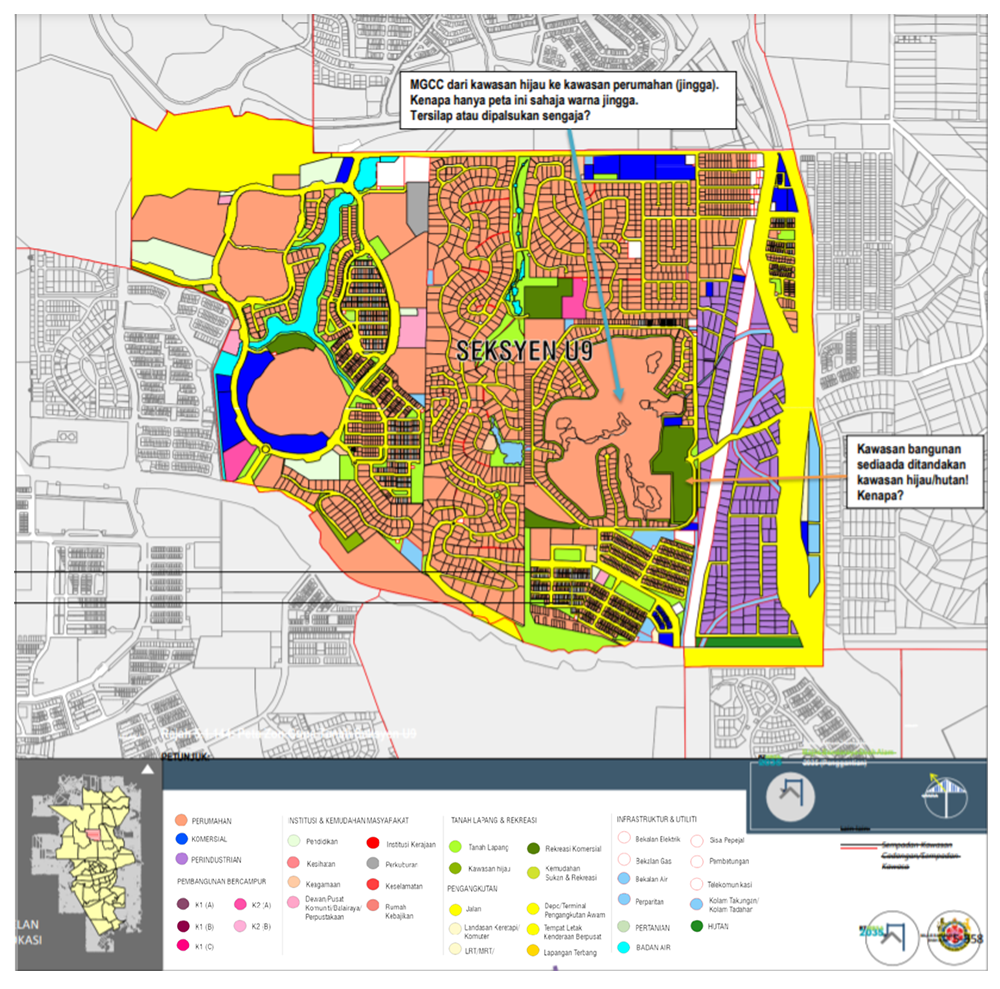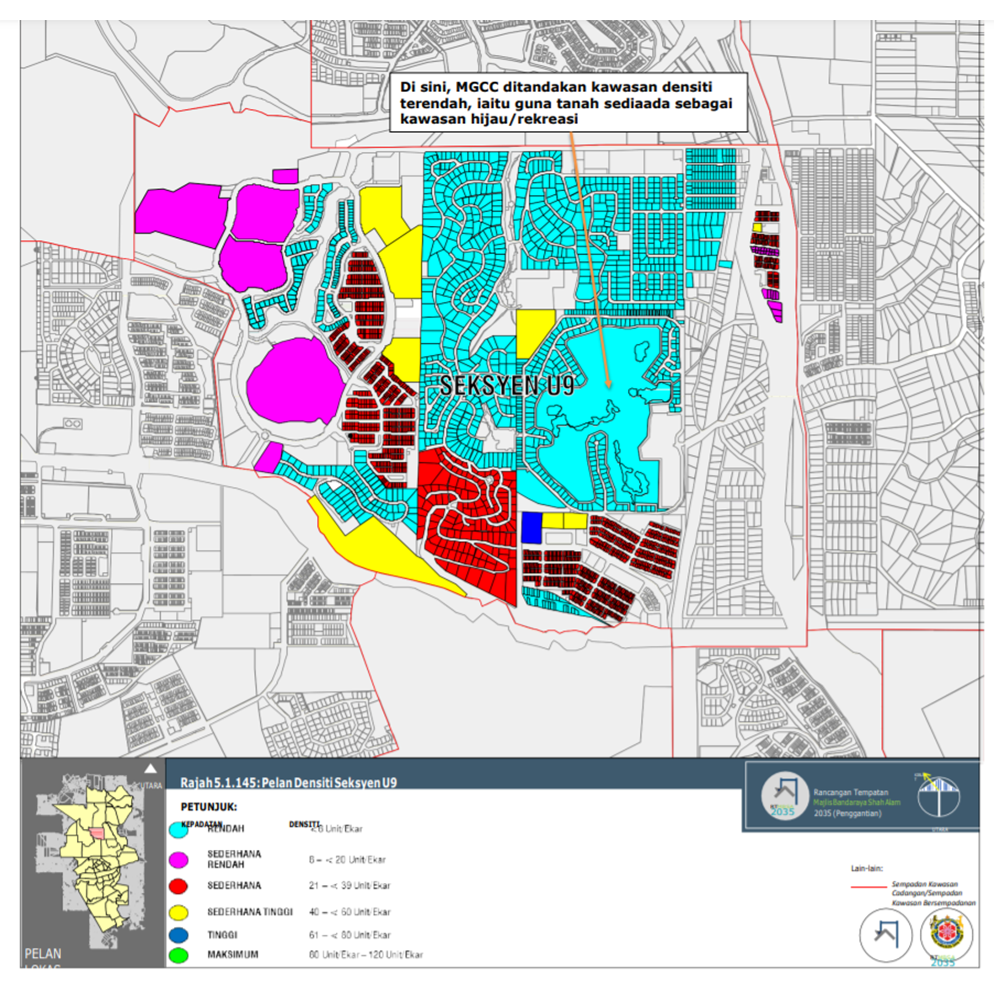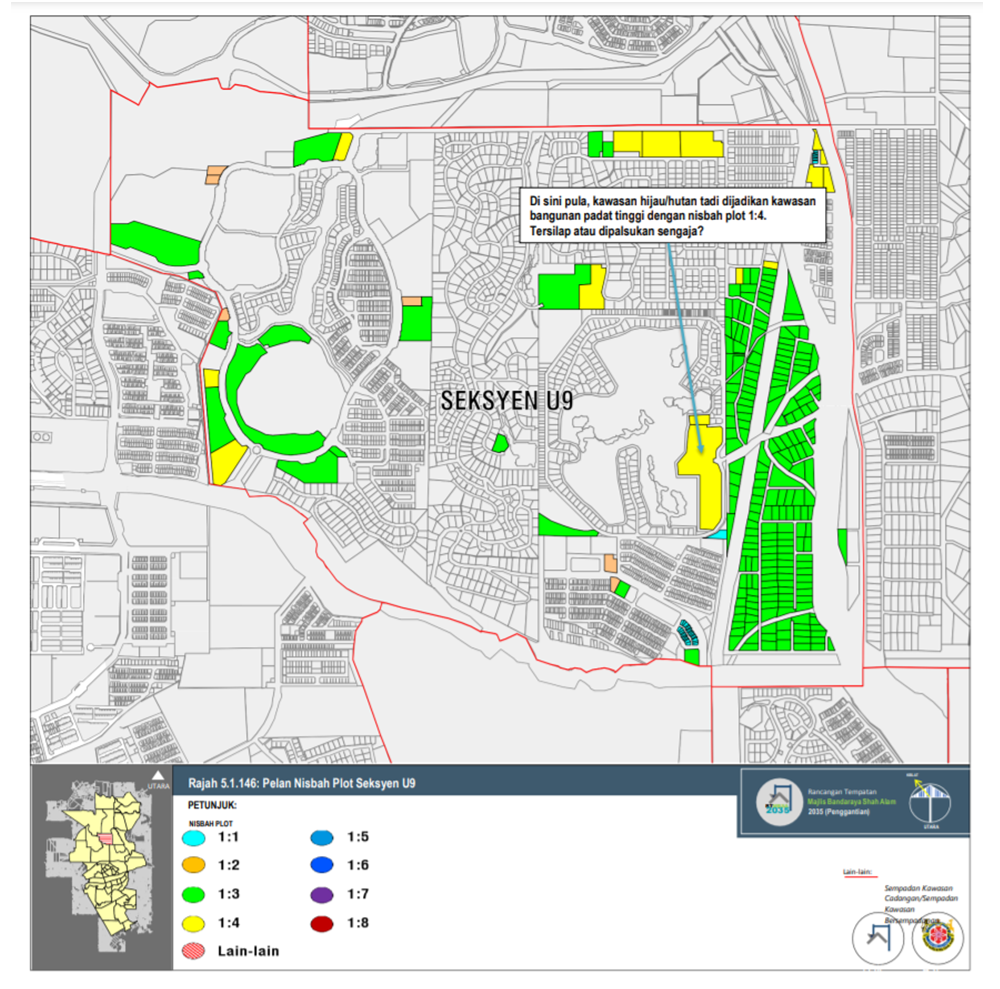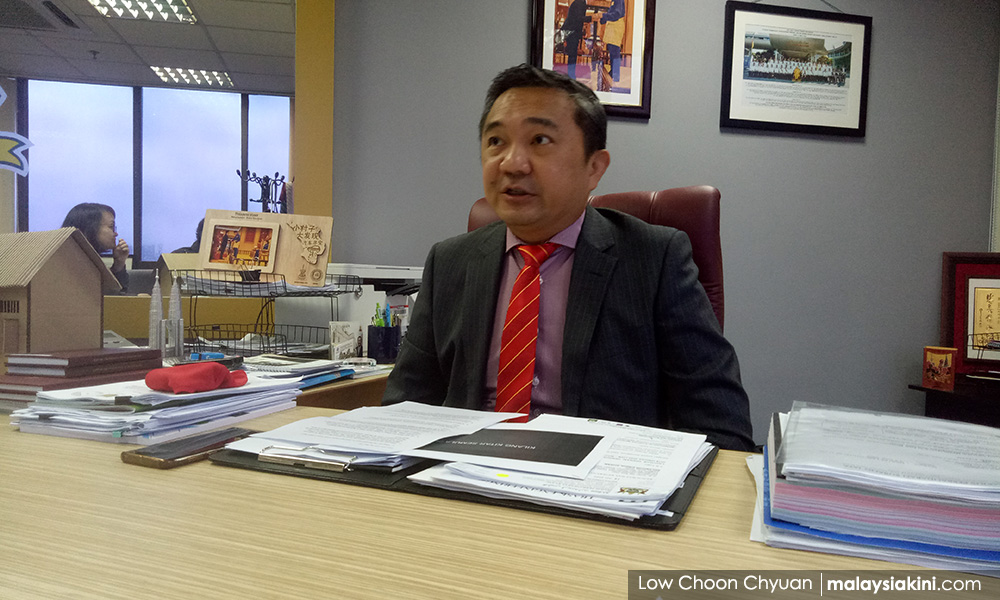This story is about how suspected tampering of the draft Shah Alam Local Plan 2035 may lead to the destruction of a large intact natural green lung situated right in the centre of Shah Alam.
Literally by the stroke of a (coloured) stylus pen, a key land-use map is manipulated to indicate that this green lung is to be converted into a high-density mixed development.
Readers may form their own conclusions whether this action was deliberate or just a careless mistake.
The Majlis Bandaraya Shah Alam (MBSA) issued its Draf Rancangan Tempatan MBSA 2035 (DRTMBSA2035) for public feedback in August 2020 in accordance with the requirement of the Town and Country Planning Act 1972.
Structure/ local Plans set the vision for development planning for the next 10 to 15 years, and more importantly, pre-determines land-use zoning.
All development programmes have to legally adhere to these plans, as attested by the recent ruling by the Environmental Quality Act Appeal Board, where the Environmental Impact Assessment for the Penang South Islands Reclamation project was rejected because of non-conformity to the Penang Structure Plan.
The DRTMBSA2035 attracted much public attention because of the proposed conversion of the Shah Alam Community Forest. The year-long saga is not resolved yet.
In the latest twist, state executive councillor Hee Loy Sian claimed the forest had been excised to private developers by the previous government.
However, there seems to be no evidence whether de-gazettement has been properly done in accordance with the National Forestry Act 1984.
The current government cannot just condone an illegal act by the previous government, especially when it can cause irreversible damage.
Amidst this, the Monterez Golf and Country Club Resort (MGCC) green lung is proposed to be converted into a high-density mixed development.
The MGCC is the last remaining centrally located natural landscape in Section U9. The MGCC covers about 200 acres of natural, elevated, undulating landscape consisting of lakes, waterways, wild trees, and dense greenery.
It is also centrally located within the larger perimeter of urban/growth areas such as the Shah Alam city centre, Elmina, Kwasa Damansara, Bukit Jelutong, and Setia Alam (page 4-18 of DRTMBSA2035). This proposal reportedly received the most number of objections of about 700.
Searching for the needle in the haystack
Word soon got around among the local community about this proposed conversion.
Coincidentally, a master plan of the proposed mixed development was circulated among the community, as if the proposed conversion was a done deal.
I was approached by the residents association to help out in crafting the objection to the proposed conversion.
My usual approach is to find out whether the proposed conversion is fully justified in accordance with the vision and mission of MBSA, and if so, there would be no reason to object. Public interest should override private interest.
After several reviews of the main text of the 700-page draft Local Plan, my finding was that there is no justification at all or even a sentence, phrase, or word on the proposed conversion of the MGCC.
In fact, the DRTMBSA2035 categorically argues against such conversion and makes a strong case for retaining and enhancing such natural green space.
I then had to zero in on the various maps and graphics, its confusing colour shading, minute-size legends, fine prints, and this is what I discovered.
One key land-use map seems to have been surreptitiously altered to conform to the proposed conversion.
The maps below clearly point to suspected tampering. Annotations are by the author, and readers may refer to the original DRTMBSA2035 if the reproduced maps are not clear.

The only evidence of the proposed conversion appears in the land-use zoning map (page 5-358) of Section U9, with an orange shade colour (for housing) covering the MGCC.

However, all other maps indicate retaining MGCC as a green lung. For example, the density map (page 5-359) shows that same area with a light blue colour code, indicating the current lowest density of fewer than eight units per acre.
The Landscape Area Plan (page 4-17) indicates MGCC to be retained as a green and recreational area.
Interestingly, the same land use map (page 5-358) with a green colour code (bottom right) shows the currently built-up clubhouse and facilities as a green lung/forest.

However, in the map of plot ratio for that area (page 5-360), the same area is coloured yellow, indicating a plot ratio of 1:4, implying conversion to a high rise building. It seems to be an attempt to show that a green lung/forest is to be created from buildings but then immediately converted to a high rise building.
The stated 2035 Vision for Shah Alam is to be an internationally acclaimed green city, sustainable, and resilient. The mission (page 4-277) is to nourish a sustainable, smart and liveable city.
Accordingly, the proposed future environment-friendly sustainable development path aims to redress several past mistakes, weaknesses, and problem areas and to cater to pressing and emerging issues.
These include the need for controlled development focusing on preserving and enhancing environmentally sensitive areas; protecting the importance of Development Block 3 where MGCC is located having several rivers and waterways (page 4-133); preserving the area surrounding the MGCC having the highest potential for landslides in Shah Alam (page 4-137); the requirement for Shah Alam to increase its green and recreation area by 67 percent or an additional 1,325 ha, based on Selangor standards.
In this respect, the DRTMBSA2035 recognises Development Block 3, where MGCC is located has the lowest green and recreation areas among the 5 Blocks (page 4-16); the Landscape Area Plan indicates MGCC should be retained as a green and recreational area (page 4-17).
Consequently, the map for potential green building areas does not include MGCC as it is already a green lung (page 4-133); and recommends building artificial flood retention/mitigation ponds/sinks in neighbouring section U10 and U12 (page 4-236), which is a sickening joke when at the same time the MGCC natural sponge and reservoir is proposed to be destroyed.
It is mind-boggling that the MGCC is supposedly recommended to be converted to high-density mixed development with all these recommendations.
After reviewing all these in totality, the DRTMBSA2035 makes a strong case for the current land use of MGCC to be retained and its ecological functions further enhanced. The resulting maps should not and cannot deviate from the stated objectives and justifications given, as it would be tantamount to “the tail wagging the dog”.
So how did this conversion proposal appear like a sticking sore thumb but carefully camouflaged, contradicting all these important precepts directly?
Privatising profits, socialising costs
To resolve this mystery, let’s look at the history of the development of MGCC.
In 1992, the state authorities approved the integrated Monterez golf course/residential development, offering a lease of 99 years, and with an express condition that at least 75 percent (or 150 acres) of the land shall consist of a golf course.
Over the years, the leaseholder, Melati Mewah Sdn Bhd (MM), a wholly-owned subsidiary of MWE Holdings Bhd (MWE), sold land and houses at premium prices, with contractual obligations in the sales and purchase agreement to build and maintain the golf course for the benefit of the buyers.
However, in breach of these contractual obligations and without consultation, MWE announced in Nov 2016 that MM entered into a joint development agreement (JDA) with Pristine Primavera Sdn Bhd, a wholly-owned subsidiary of Newfields Land Sdn Bhd.
MGCC was transacted with a price tag of hundreds of million ringgit, based on a gross development value of RM1.5 billion consisting of a high-density mix of residences, offices and shopping complexes.
However, MWE subsequently opted to sell the land outright rather than a JDA, probably to escape its contractual obligations of preserving the golf course.
Probably the last hurdle that saved the MGCC was its designation of land use as commercial recreation in the current Rancangan Tempatan MBSA 2020.
MWE was subsequently delisted from Bursa Malaysia and taken private on Sept 20, 2018, after this profitable transaction, leaving the buyers/residents in a lurch.
I wrote to the Shah Alam Mayor on Oct 16, 2020, highlighting this suspected tampering but did not receive any response.

At the public hearing on Apr 8, 2021, chaired by state exco Ng Sze Han and attended by the mayor and other heads of department, I presented these anomalies, but none of them responded nor even denied the allegations made.
However, Ng remarked that it would be financially prohibitive for the state government to take over the land, to which I responded as below.
Shah Alam Public Recreational Park
A leaseholder does not own the land but only has the right to use the land for the express purpose and period stated. That is why any dealings on the land have to get the state authorities' prior approval.
It goes with saying that any breach of the express conditions can automatically lead to forfeiture of the lease rights without any compensation.
The state authorities could not have approved, hopefully, the dealings above, considering it is still zoned for a golf course and tied to the contractual obligations to the buyers to preserve the golf course.
Any private dealings without the approval of the state authorities are illegal and cannot be sustained.
Therefore, the options moving forward are (i) to sustain and bind the leaseholder to the express conditions on the said land, and (ii) if there is a breach of the express conditions by the leaseholder, then the state can forfeit the land rights with any compensation.
It is only logical that the state government honours its own stated vision and mission of the DRTMBSA2035 and preserve the MGCC as a public recreational area.
In order to serve a wider section of the population, recreational activities can be further enhanced by reducing the golf facilities. The funds allocated to create, rehabilitate and green degraded areas elsewhere should instead be used to preserve this existing intact natural large green lung.
Just like the Kuala Lumpur Lake Gardens, the MGCC can be enhanced as the Shah Alam Public Recreational Park to serve the surrounding rapidly urbanising growth corridors.
Any other decision, in the face of what appears to be manipulation of one map to destroy the MGCC, is principally wrong or even illegal.
The DRTMBSA2035, prepared by qualified independent consultants, must have been vetted thoroughly by the state agencies, technical committee and the MBSA Council before public consultation.
One wonders how such an anomaly could have passed through such scrutiny. The state authorities could be dragged into legal disputes if the contractual rights of the affected parties are not honoured.
The impression created is that the state is championing the greed of developers rather than for public interest. Shah Alam needs more natural green spaces, not buildings that only compound the myriad urban problems, and which the taxpayers have to pay to address for years to come.
This is not an isolated incident but something that frequently happens everywhere. Developers advertise green areas, parks, fantastic views, but soon one by one will be gone.
It is better not to be enticed and pay premium prices and regret later. Unless, of course, the authorities strictly follow the structure/local plans as agreed and are not enticed by the developers.
But the public needs to be organised, vigilant and scrutinise any development plans before it is adopted.
Recent incidents show the politicians we voted in invariably pander to private interests and only back down after intense protest from the public.
RAMAN LETCHUMANAN was director, Environment/Conservation, Ministry of Science, Technology and the Environment (1993-2000), head of Environment/ Haze/Disaster Management, Asean Secretariat, Jakarta (2000-2014), and senior fellow at S Rajaratnam School of International Studies (RSIS), Nanyang Technological University, Singapore (2014-2016). Email: raman.asean@gmail.com.
The views expressed here are those of the author/contributor and do not necessarily represent the views of MMKtT.




No comments:
Post a Comment
Note: Only a member of this blog may post a comment.